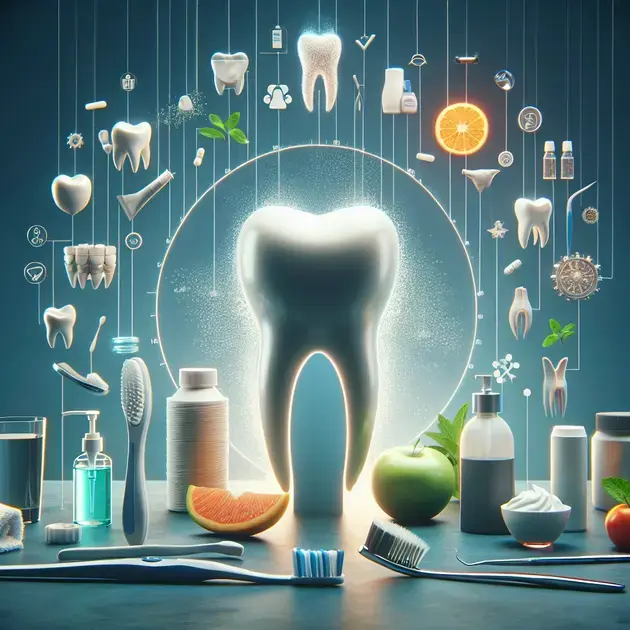When it comes to maintaining good oral hygiene, knowing the optimal ways to care for your teeth & gums is essential for overall health. Proper dental care not only helps prevent cavities and gum disease, but it can also have a positive impact on your overall well-being. From regular brushing and flossing to bi-annual dental check-ups, there are several key practices that can help keep your smile in top shape.
Recent studies have shown that the health of your teeth and gums can have a significant impact on your heart health. Maintaining optimal oral hygiene can reduce the risk of cardiovascular disease and other serious health conditions. By following the best practices for dental care, you can not only achieve a brighter smile but also improve your overall health and well-being.

**
Optimal Oral Hygiene Practices**
Optimal oral hygiene practices are crucial for maintaining healthy teeth and gums. A step-by-step routine can help ensure that your oral health remains in top condition. Start by brushing your teeth at least twice a day with a fluoride toothpaste. Use a soft-bristled toothbrush and gentle circular motions to clean all surfaces of your teeth. Incorporate flossing into your daily routine to remove plaque and food debris from between your teeth. Consider using an electric toothbrush, such as the Philips Sonicare DiamondClean, which offers advanced technology for a thorough clean.
Additionally, incorporate mouthwash into your oral hygiene routine to help reduce plaque and prevent gum disease. Look for alcohol-free options like Listerine Total Care Anticavity Mouthwash, which can provide multiple benefits in one solution. Stay hydrated throughout the day to promote saliva production, which plays a key role in maintaining oral health.
Regular dental check-ups are essential for optimal oral hygiene. Schedule bi-annual visits with your dentist for professional cleanings and comprehensive exams. Consider using apps like Zocdoc to easily book appointments and receive reminders for your next visit. Following these optimal oral hygiene practices can help prevent tooth decay, gum disease, and other oral health issues.
**
Preventive Dental Care for a Healthy Smile**
Preventive dental care is essential for achieving and maintaining a healthy smile. Taking proactive steps to care for your teeth and gums can help prevent various dental problems in the long run. Start by practicing good oral hygiene habits, such as brushing and flossing daily. Use a toothpaste like Colgate Total that is specifically formulated to protect against cavities, plaque, and gingivitis.
Professional dental cleanings are a crucial aspect of preventive care. Consider scheduling regular visits with a dental hygienist to remove plaque and tartar buildup that brushing alone may not address. Apps like Dentulu offer on-demand dental services, allowing you to schedule cleanings and other preventive care procedures at your convenience.
Another important preventive measure is the application of dental sealants to protect your teeth from decay. Your dentist can apply a thin plastic coating to the chewing surfaces of your molars to seal off pits and fissures where bacteria can accumulate. By incorporating preventive dental care practices into your routine, you can enjoy a healthy smile for years to come.
**
The Link Between Oral Health and Overall Well-Being**
The link between oral health and overall well-being is significant, as the health of your mouth can impact your entire body. Taking care of your oral health can help prevent systemic diseases and improve your quality of life. Start by understanding the connection between oral health and conditions like heart disease, diabetes, and respiratory issues.
Practicing good oral hygiene, such as using a tongue scraper to remove bacteria and debris from your tongue, can have positive effects on your overall health. Consider using apps like Oral-B’s Oral-B App to track your brushing habits and receive personalized recommendations for better oral care. Maintaining a balanced diet rich in fruits, vegetables, and whole grains can also support your oral and overall health.
Incorporate stress-reducing activities into your daily routine, such as meditation or yoga, to help reduce the impact of stress on your oral health. Apps like Calm or Headspace offer guided meditation sessions to promote relaxation and overall well-being. By recognizing the link between oral health and overall well-being, you can take proactive steps to enhance both aspects of your health.

Effective Dental Habits for Maintaining Oral Wellness
When it comes to maintaining oral wellness, developing effective dental habits is crucial. One of the most important habits is to brush your teeth at least twice a day with fluoride toothpaste. Brushing helps remove plaque, bacteria, and food particles that can lead to cavities and gum disease. Make sure to use a soft-bristled toothbrush and brush in gentle, circular motions to avoid damaging your gums.
Flossing is another essential dental habit that many people overlook. Flossing helps remove plaque and food debris from between the teeth and along the gumline, where your toothbrush may not reach. Be sure to floss at least once a day, gently moving the floss up and down between each tooth.
Regular visits to the dentist are also key to maintaining oral wellness. Dentists can detect early signs of dental issues and provide professional cleanings to remove stubborn plaque and tartar buildup. Additionally, dentists can offer personalized advice on oral hygiene practices and lifestyle habits that can improve your oral health.
Another effective dental habit for oral wellness is to limit sugary and acidic foods and beverages. These substances can erode tooth enamel and contribute to tooth decay. Instead, opt for a balanced diet rich in fruits, vegetables, lean proteins, and dairy products to support strong teeth and gums.
Lastly, don’t forget to stay hydrated by drinking plenty of water throughout the day. Water helps wash away food particles and bacteria, reducing the risk of cavities and gum disease. By incorporating these effective dental habits into your daily routine, you can maintain optimal oral wellness and enjoy a healthy smile for years to come.
Importance of Regular Dental Check-ups
Regular dental check-ups are essential for maintaining good oral health and preventing dental problems. During these appointments, your dentist will perform a thorough examination of your mouth, teeth, and gums to check for any issues such as cavities, gum disease, or signs of oral cancer. Early detection of these problems can lead to more effective treatment and prevent further complications.
In addition to exams, regular dental check-ups typically include professional cleanings to remove plaque and tartar buildup that can’t be removed with regular brushing and flossing. These cleanings help prevent gum disease and keep your teeth and gums healthy.
Another important aspect of regular dental check-ups is the opportunity to discuss any concerns or questions you may have about your oral health. Your dentist can provide personalized advice on oral hygiene practices, dietary choices, and lifestyle habits that can improve your oral health and overall well-being.
For individuals with certain risk factors such as a history of gum disease, smoking, or diabetes, more frequent dental check-ups may be recommended. By staying consistent with your dental appointments, you can stay proactive in caring for your oral health and address any issues before they progress into more serious conditions.
Overall, regular dental check-ups play a vital role in maintaining optimal oral health and preventing dental problems. By prioritizing these appointments and following your dentist’s recommendations, you can enjoy a healthy smile and strong teeth and gums for years to come.
Nutritional Tips for Stronger Teeth and Gums
In addition to practicing good oral hygiene habits, maintaining a healthy diet is essential for strong teeth and gums. Certain nutrients play a key role in supporting oral health, including calcium, vitamin C, vitamin D, and antioxidants. Incorporating these nutrients into your diet can help strengthen your teeth and gums and prevent dental issues.
Foods rich in calcium, such as dairy products, leafy greens, and almonds, are crucial for maintaining strong teeth and bones. Calcium helps protect tooth enamel and prevent decay, so be sure to include plenty of calcium-rich foods in your diet.
Vitamin C is also important for oral health, as it helps promote healthy gums and can reduce the risk of gum disease. Citrus fruits, strawberries, and bell peppers are excellent sources of vitamin C that you can incorporate into your meals and snacks to support your gum health.
Another essential nutrient for strong teeth and gums is vitamin D, which helps your body absorb calcium and supports overall oral health. Fatty fish, fortified dairy products, and egg yolks are great sources of vitamin D that you can include in your diet.
Lastly, antioxidants such as green tea, berries, and nuts can help reduce inflammation and protect against periodontal disease. Including a variety of antioxidant-rich foods in your diet can help maintain healthy gums and prevent oral health issues.
Conclusion
In conclusion, maintaining optimal oral wellness requires the development of effective dental habits, such as brushing at least twice a day, flossing daily, and visiting the dentist regularly. These habits help prevent cavities, gum disease, and other dental issues by removing plaque and tartar buildup and detecting problems early on. It is also crucial to limit sugary and acidic foods, opt for a balanced diet rich in essential nutrients like calcium, vitamin C, and D, and stay hydrated to support strong teeth and gums.
Regular dental check-ups play a vital role in ensuring good oral health, as they allow for thorough examinations, professional cleanings, and personalized advice from dentists. By prioritizing these appointments, individuals can stay proactive in addressing any oral health concerns and maintaining a healthy smile for years to come. Additionally, incorporating nutrient-rich foods like dairy products, fruits, and antioxidants into the diet can further enhance oral health by strengthening teeth and gums and reducing the risk of gum disease.
Overall, by adopting these effective dental habits, attending regular check-ups, and following nutritional tips for stronger teeth and gums, individuals can significantly improve their oral wellness and overall quality of life. Taking care of oral health is essential for maintaining a confident smile, preventing dental problems, and promoting long-term well-being.



